Smoking and dental practices often contradict each other. But today we are not talking about the harms of nicotine, but the first swelling after dental manipulations. Can I smoke immediately after brushing my teeth? How long does it take to smoke a cigarette without fear of harming yourself? What are the harms of smoking after teething? You will find the answers to these questions in the article.
TREATMENT MEASURES
After tooth extraction, an open bleeding wound remains in place. If a wisdom tooth is removed, a large wound remains in place. To stop the bleeding, the dentist covers the wound with a cotton swab dipped in a medical solution that must be removed after 20 minutes. After the polar is removed, a small blood clot forms in the hole of the missing tooth, which should never be removed. This clotting is a guarantee of bone tissue regeneration and helps a fresh wound to heal quickly.
Do not try to remove the blood clot from the well: it is necessary for rapid tissue regeneration.
The dentist would treat the hole with a healing agent and he would have to take a course of antibiotics after the wisdom teeth were removed. However, antibiotics are not prescribed in all cases, but when a molar operation with crooked or strongly enlarged roots is performed.
When a large wound surface is formed, sutures may be applied. In this case, the first puffing can be done only 2 or 7 days after this procedure. It all depends on the ability of tissues to regenerate. The stitches will heal in time and the doctor will remove the surgical sutures.
Effects of nicotine
Everyone has heard about the effects of a drop of nicotine on a horse's life, but they still smoke. How does addiction affect dental and oral health? It turns out that nicotine causes great damage to the mucous membranes, larynx and lungs. Nicotine irritates the mucous membranes, provokes various diseases of the oral cavity and promotes tooth decay.
Cigarette smoke contains a complex combination of various resins and chemicals, which prevents tissue healing. The condition is complicated by the penetration of these substances into the blood through saliva. During blowing, the human body receives hydrogen cyanide and many toxic substances, including hydrocyanic acid.
Nicotine and cigarette smoke are toxic to oral tissues. Smoking is allowed only after complete recovery of the injured mucosa.
Nicotine can have a mild analgesic effect, relieving tension by stimulating the production of happiness hormones. However, the harm done to the body is greater than the good. This should not be forgotten when justifying your habit with an analgesic effect.
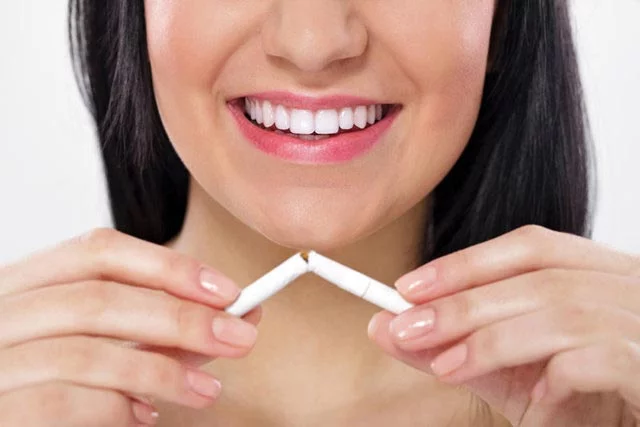
Adverse effects of smoking after tooth extraction:
- development of inflammatory processes in the tissues of the oral cavity;
- development of inflammatory process in the pit - alveolitis;
- increase in blood pressure, removal of blood clots.
The claim that nicotine has a beneficial effect on reducing stress is not supported by scientific practice. In fact, cigarette smoke creates the illusion of stress relief and exacerbates the negative effects on a physiological level:
- tachycardia;
- angina pectoris;
- breathing increased;
- impaired peristalsis;
- muscle tension.
Therefore, you should refrain from smoking for at least as long as possible, preferably a few days, after extracting your teeth. The carcinogens in tobacco smoke are very harmful to health by being layered on the surface of the wound.
ALVEOLITH
The first disadvantage of inhaling cigarettes after surgery: nicotine dries the well. A moist environment is needed for timely and successful tissue regeneration. However, cigarette smoke helps to dry the mucous membrane, which has a negative effect on the wound surface of the pit.
A dry hole is a testing ground for the activity of pathogenic bacteria that rapidly stimulate inflammatory processes. In severe cases, inflammatory processes will end with alveolitis, a serious disease. With this pathology, the walls of the pit, which are formed at least after tooth extraction, become inflamed.
Causes of alveolitis:
- Violation of tissue integrity as a result of injury;
- freshly created infection;
- Violation of blood clotting dynamics.
The symptoms are similar to intoxication of the body with the waste of pathogenic bacteria:
- muscle aches;
- headaches;
- nausea and weakness.
In addition to the general symptoms of intoxication, there are also characteristic signs of gum tissue pathology: edema of the mucous membranes, edema of the facial muscles due to inflammation. Osteomyelitis can become a complication of alveolitis with the formation of a punctured channel of continuous pus flow.
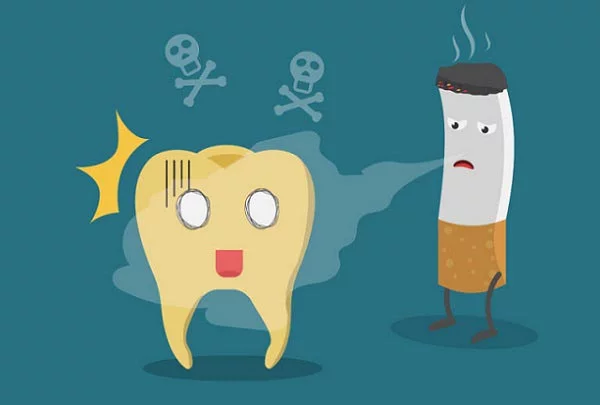
BLOOD PRESSURE
Smoked tobacco temporarily raises blood pressure, which can cause the blood clot surrounding the pit to simply "come out. "This threatens the development of an inflammatory process due to an open wound infection. Chemicals in cigarette smoke narrow the lumen of blood vessels and increase blood pressure. Vasoconstriction prevents adequate nutrition of mucosal tissues, which slows down the regeneration process.
HOISTANA Smoking, VIPING
Hookah is believed to be less dangerous for smokers due to the use of soft tobacco. Is that so? Purified tobacco smoke is less harmful to health, but has the same negative effect on the wound surface. It is placed in the mucous membrane, interferes with normal blood circulation and causes inflammatory processes.
As for the e-cigarette and hookah analogue - delete - the ban also applies. Resins are not released during the removal process, but other toxic substances are formed. They fall on the mucus and wound surfaces, harming the smoker.
Delete the composition:
- diacetyl;
- glycerin;
- propylene glycol;
- flavors.
Diacetyl aromatizer poses a special danger of poisoning when heated in a cigarette battery. In moderation, this substance is not dangerous to health, but if heated and consumed continuously, it can cause serious pathologies in the lungs.
Inhalation of smoke causes dryness of the mucous membranes in the mouth, which leads to the growth of pathogenic bacteria and their harmful effects.
Propylene glycol causes allergies and accumulates in the tissues of the mucous membrane. This substance has an irritating effect on the mucous membranes, causing inflammation and other pathologies. At high temperatures, glycerin and propylene glycol form harmful formaldehyde and acrolein.
The use of a handkerchief by several smokers causes the spread of infectious diseases, hepatitis, tuberculosis. If different people use the same pipe, the same can be said about hookah.
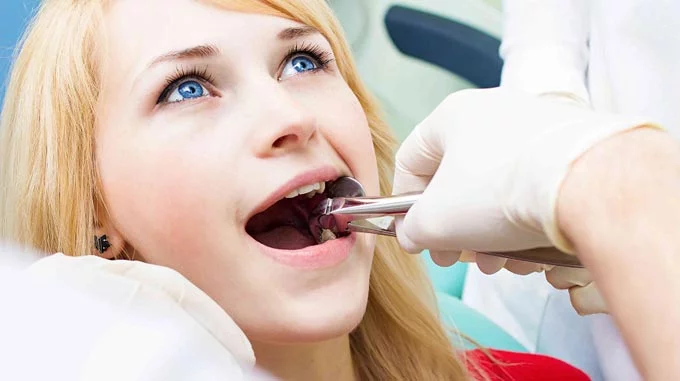
DENTAL SUGGESTIONS
Many dental and orthodontic procedures are not available for smokers unless there is a specific problem in non-smokers. Smokers should not have an operation to enlarge the jaw bone tissue, suture soft tissues, or place an implant. During traction, the implant may fall off, tearing the seams. However, you can still get results in smokers by following the precautions and strictly following the recommendations of dentists.
DESCRIPTION OF DOCTORS
- An antiseptic cotton swab can be removed 20 minutes after tooth resection, otherwise the bacteria will start to multiply;
- The blood ball in the tooth socket cannot be spit out or otherwise removed - it protects the wound from the adverse external environment, activates tissue regeneration;
- Rinse your mouth very carefully with antiseptics to prevent accidental removal of the protective ball from the well;
- It is better to replace the usual oral cavity with solutions in containers - keep the solution in the mouth and then carefully spit it out;
- If a doctor puts a medicine in a well, it should not be taken out without permission;
- The first oral hygiene can be performed only the day after resection;
- If a doctor prescribes a course of antibiotics, it must be followed;
- It is recommended to take an anesthetic during severe pain, it is not necessary to tolerate discomfort in the gums.
If the removal operation is successful, the first puff can be done after a few hours. Avoid the thought of smoking for at least 2 hours.
If the bleeding doesn't stop after 2 hours, you can't think about smoking. A strong swelling can increase the bleeding, then you need to get extra medical help.
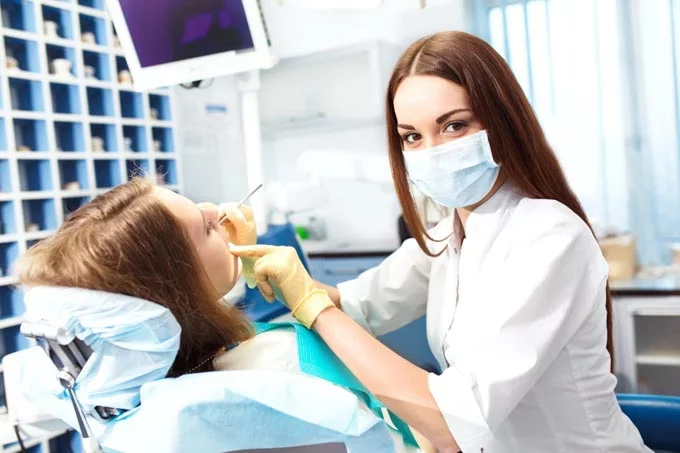
WHAT IS PROHIBITED
- Clean, rinse your mouth 24 hours after resection;
- Take a steam bath, take a hot bath, sunbathe in the solarium - an increase in temperature will increase the bleeding;
- Training in a fitness club, gym, sports section - until the wound heals and the stitches are resolved; When
- stitches are applied, it is impossible not only to squeeze, but also to smile and open your mouth wide - the stitches will fall apart quickly;
- You can eat a snack only 2-3 hours after stress, it is not recommended to drink fluids (or carefully with straw);
- Alcohol is strictly forbidden - the blood is strongly thinned, the wound will begin to bleed;
- You can't drive a car today, it's better to call a taxi.
For a while, you will have to give up ordinary spicy, salty foods, very hot / cold foods. This means you can't eat ice cream, drink cold fruit or drink freshly brewed coffee. Sour mushrooms and pickles are also prohibited for some time, it is advisable to refrain from smoked meats.
You should also avoid rough foods: croutons, hard fruits, vegetables. You will not eat carrots and radishes for several days in a row. Food should not be soft, salty or peppery. You will have to sit on a spare diet for a few days until the tissues are completely healed.
WHAT YOU SHOULD SEE
- If pain passes, apply ice to your cheek - but not for more than ten minutes;
- hot herbal baths - will soothe damaged tissues, eliminate swelling, relieve pain;
- Take painkillers, anti-inflammatory drugs, except aspirin and analgin - they thin the blood.
If you are on medication, you should inform your dentist. Will regulate medication intake. Some drugs affect the viscosity of the blood and cause bleeding, so its use should be discontinued for some time.
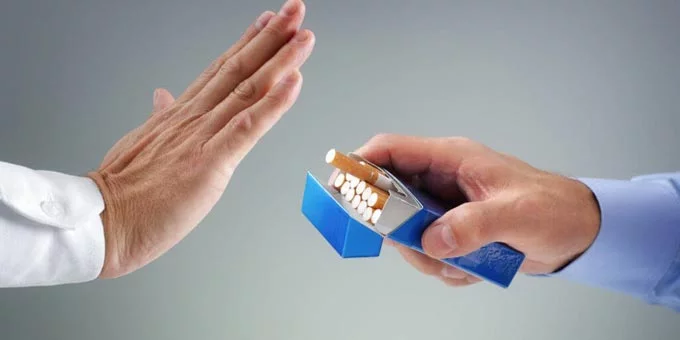
TOTAL
Cigarette smoke causes the development of various pathological diseases that prevent the rapid healing of damaged tissues. Therefore, it is not possible to drag the tooth for at least a few hours, after pulling the gums for a few days. The mist contains many toxic substances that fall on and damage the damaged bark.
Tobacco smoke also dries the mucous membranes, which poses a threat to the blood clot inside the hole - it is responsible for restoring the integrity of the tissues, preventing the penetration of microbes.

























